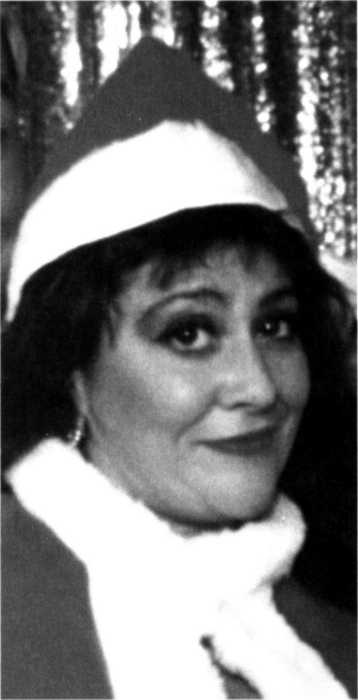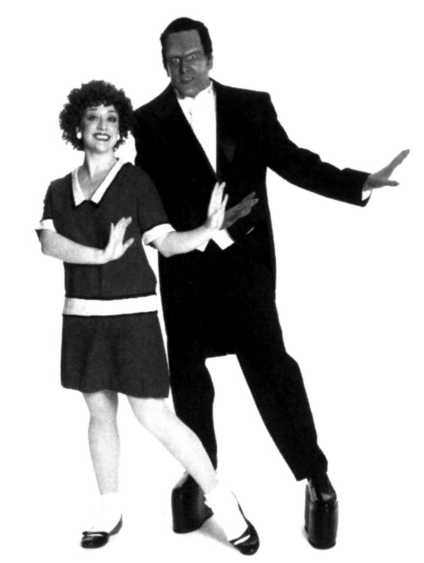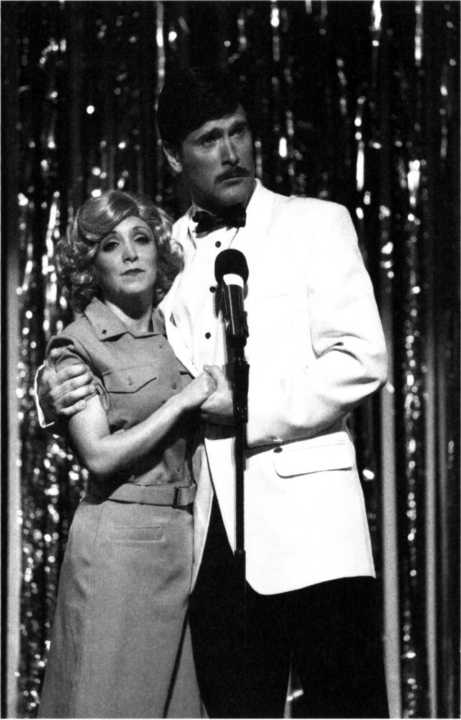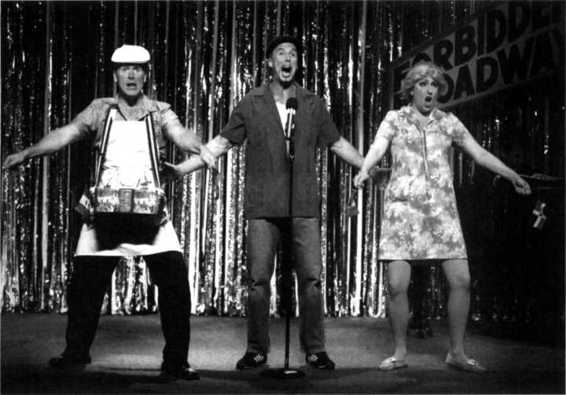Forbidden Broadway: Behind the Mylar Curtain (122 page)
Read Forbidden Broadway: Behind the Mylar Curtain Online
Authors: Gerard Alessandrini,Michael Portantiere

1 performed in several editions of Forbidden Broadway in Boston and New York, and I'll
never forget how a pie plate helped me get through the 1990 edition at Theatre East.
I had just moved from Boston to take the position of understudy, and Marilyn
Pasekoff got sick during the week when the critic from the New York Times was coming. I hadn't had a chance to begin rehearsals
for the "Teeny Todd" number, and I may have
seen it performed once. I had no idea how I
would remember the lyrics. Then a little light
went off in my brain and I said, "Quick, get me
a pie plate!" I wrote the lyrics on the inside of
the plate, which instantly became my most
valuable prop ever.

Denice Dawn.
My biggest concern was to angle the plate
so that no one in the audience would see the
lyrics. I was never so pie-plate focused in my
entire life, and the experience left me with a
great respect for kitchen items. To this day, I
cannot see an aluminum pie plate without
remembering the one that saved my career.
The story was leaked that I performed
the number without a single rehearsal, and
we ended up getting a great write-up from
the Times. How much fun for us all! (There's
still a copy of that review somewhere in my
mother's house in Boston.)
One of my favorite onstage mishaps happened during a tango number, when one of my four-inch-heel black stiletto shoes went flying off into the audience. (Fortunately,
it didn't impale anyone.) After the number, I went crawling on my hands and knees
to the edge of the stage and said to the audience, "Does anyone have my shoe?"
Someone seated at one of the front tables handed it to me, and I slunk offstage in
the nick of time as the lights came up for the next number.
Performing with the FB family was one of the happiest times in my life (tears
now falling down my face).
By the spring of 2008, things were looking up, due in large part to the return of
some big stars to Broadway. With Patti LuPone headlining a revival of Gypsy, we were
off and running. I also felt reinvigorated by the excellent revivals of South Pacific and
Sunday in the Park with George; I'd never really spoofed those shows before and was
more than happy to do so. What greater challenge can a parodist ask for than to rewrite
"Some Enchanted Evening" and "Putting It Together?"
The new edition of the show was titled Forbidden Broadway Goes to Rehab, and the more we worked on it, the more
jazzed we became. We put in new spoofs of Liza, Bernadette,
and Kristin (Chenoweth). Add to this Mel Brooks handing
out twofers for Young Frankenstein, plus Daniel Radcliffe
strutting naked in Equus, and our own special version of the
Pulitzer Prize-winning play August: Osage County.

Kristen Mengelkoch and Jared Bradshaw in
Forbidden Broadway Goes to Rehab.
We've spoofed relatively few plays over the years; musicals are much better targets because they're so big. Generally speaking, we only tackle plays if they're marketed like
musicals of if they have well-known stars: Amadeus, Speedthe-Plow, Master Class, August: Osage County. With plays,
it always helped if we could make them into musicals. As
I've noted about through-composed shows, one good thing
about them is that they avoid the drop in energy that happens when the characters stop singing and start talking.
We've had to be careful of that in our show. For example,
we initially had a problem with our SpringAwakeningspoof
because there was too much dialogue and not enough singing in it.
But I love spoofing plays. They're easier to do because when you're writing dialogue,
you obviously don't have to set a certain number of syllables to a certain section of
music, and you don't have to rhyme anything. What a relief! Still, we've avoided having
lengthy dialogue sequences in Forbidden Broadway because of that drop in
energy.

"Some Endangered Species": Christina Bianco and Jared
Bradshaw spoof South Pacific.
Of course, the focal point of any new
edition of FB is the TonyAward-winning
Best Musical of that season. Spoofing In
the Heights wasn't easy because I had
to learn to write Latino hip-hop. Needless to say, this was a daunting task for
a guy who's devoted most of his career
to rewriting the lyrics of Cole Porter
and Jerry Herman. After spending two
weeks deciphering the rhyme scheme,
scansion, and vocabulary of the show's
title song, I felt like I had decoded the
Rosetta stone.
I was ecstatic that eventually I was
able to write a successful spoof in the
vocabulary of Lin-Manuel Miranda,
and I was very excited to show it to the
cast. To my surprise when I brought it
in to them, they looked confused, and
Phill said: "This number isn't very good.
Maybe you should do a rewrite." But
Michael West, who was slated to play
Lin-Manuel, said, "I like it! Let's give it a
try." David Caldwell, who had been our
excellent musical director for five years
at that point, meticulously lined up the
music and the parody lyrics.
After several days of working on the number, we put it all together. It sounded great
and it was also quite different from anything else we had ever done in Forbidden. It
helped that Phill and the cast came up with some terrific comic bits, such as having
Maria from West Side Story burst onto the scene. Bill Selby, our longtime assistant
director and standby, added the cherry on top when he suggested I change the last
line of the song to "It's West Side Story light."

"In the Heights" with Jared Bradshaw, Michael West, and Gina Kreiezmar.
A last-minute addition to Forbidden Broadway Goes to Rehab was the "All That Chat"
number. This was an example of where the difficulty of routining the show comes
into play. The running order had been set near the end of previews, but one very old
number remained: "Glossy Fosse," our spoof of Chicago. We needed something new,
and In the Heights had to come after it to make the show seem fresh and super-topical.
So my assignment was to create a new number that would only require very simple,
black costumes into which the actors could quickly change from the tuxes and cocktail dresses they wore in the title number, and it had to be two and a half minutes in
length to give Michael just enough time to change into Lin-Manuel. But, as the second
number in the show, it couldn't be filler; it had to hit one out of the park. And it had
to be a very well-known song, so the audience would immediately he in on the joke
of the rewritten lyrics.
I thought "All That Jazz" from Chicago would be good source material, but what
could the parody be about? During a rehearsal break one day, I was racking my brain
and poring over my notes while the actors annoyed me by talking excitedly about the
delightfully nasty things they had read on "All That Chat," a theatre message board
on the Web site TalkinBroadway.com. I was about to sweetly and politely scream at
them to shut up when I thought: "All That Jazz ... All That Chat." There it was, right
in front of me!
Of course, I did not come up with the phrase "All That Chat." It belongs to the
site's creator(s). But I had a great time turning the "All That Jazz" lyrics inside out
and making fun of people like Bruce Memblatt partaking in endless online arguments over whether Michael John LaChiusa's The Wild Party is better than Andrew
Lippa's.